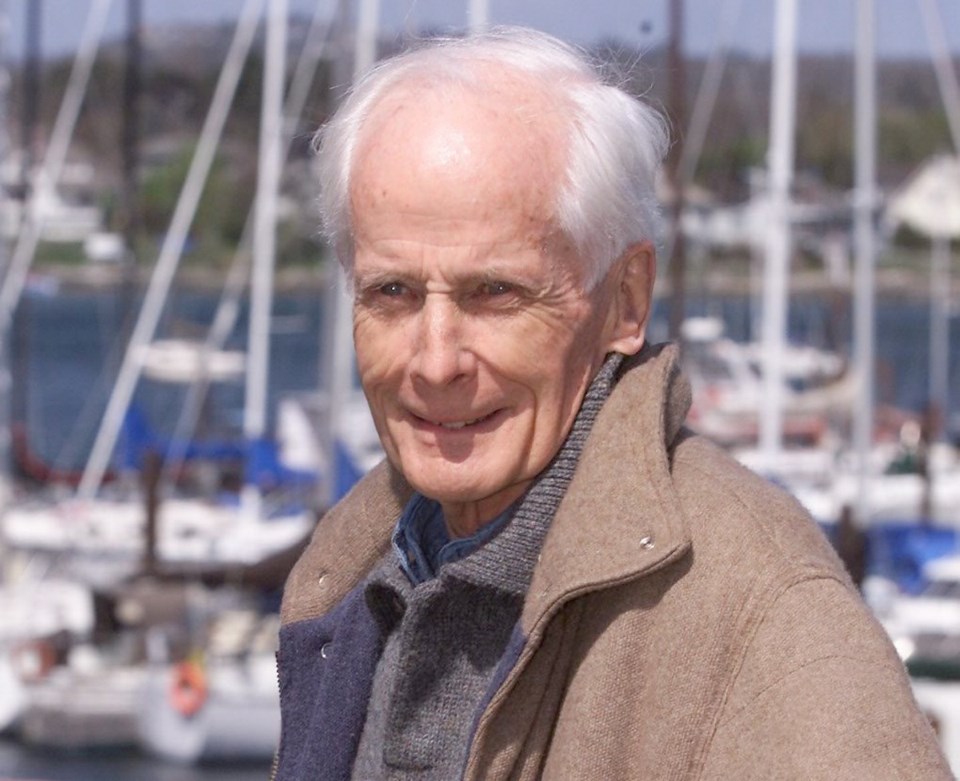One of the most important contributions made by former Victoria mayor Peter Pollen is not what you see, but what you don’t: forests of highrise buildings around the Inner Harbour.
Pollen, who died Tuesday at the age of 89, served four two-year terms as mayor in the 1970s and 1980s. Those were formative years for Victoria, and the city could have gone in a vastly different direction if it hadn’t been for his leadership.
Pollen fell in love with Victoria when he moved to Vancouver Island in 1963, and that passion never waned.
“Now that I am in my 89th year, rarely a day goes by when I don’t thank my stars for living my life in this wonderful city,” he wrote in a Times Colonist commentary a year ago today. “Unfortunately, it’s easy to spoil a paradise with one big mistake.”
He was writing in opposition to the development of a mega-yacht marina on the north shore of the harbour. It was a variation on a theme he repeatedly expressed through the years.
“When I first ran for mayor, it was to prevent a big mistake,” he said. “Under political pressure, the city was poised to approve a huge construction project comprising three, 30-storey buildings called the Reid Towers, two on the harbour shore and one in the water. Completely out of scale, they would have blocked the waterfront and dominated the Empress Hotel and legislature.”
He wrote that as a businessman, he always favoured “sound and appropriate development,” but in his view, the new marina was not appropriate.
“As with the Reid Towers, there is something outlandish in a promoter’s plan to invade the quiet North Shore walkways, waterways and views enjoyed by so many Victorians, in order to build a marina for storing large luxury yachts,” he wrote.
“To make space for the marina they intend disrupting and displacing thousands of regular users of what is, in fact, public land, a combination of city waterfront and a Crown-land water lot controlled by the province.”
His opinion notwithstanding, the marina development was approved and is expected to be completed this spring.
He didn’t always win his battles to protect the unique character of Victoria, but he won enough.
“Twenty-five years ago, Victoria’s business and civic climate strongly favored a proliferation of highrises; the momentum seemed unstoppable,” said a 1995 Times Colonist editorial. “But … Pollen made others see the folly of that route and, as a result, Victoria hasn’t become a small-scale replica of Vancouver.”
Former TC columnist Jim Hume referred to him as the “mercurial Peter Pollen whose arbitrary planning ideas were often challengeable, but who, possibly more than any other chief magistrate, forced Victorians to think about the emerging face of their city.”
He was a plain talker. Commenting on his willingness to hear from the public while mayor, he said: “We never turned anyone down. I listened to lunatic after lunatic.”
That earned him a scolding, in the form of a Times Colonist opinion piece from former B.C. ombudsman Dulcie McCallum, who said Pollen’s comment disparaged people with mental disabilities.
But Pollen, while sometimes blunt, was not insensitive. Michael Elcock, former chief executive of Tourism Victoria, wrote that Pollen was “a man of intelligence, and a mayor who had a rare sense of vision for the city. In particular, he had a very good idea that things work better when people actually live in numbers in a city centre, instead of simply visiting it during office hours or the tourist season.”
Pollen could look past the popular thing of the moment and see what was good for the long term. Victoria still benefits from that vision and leadership.



